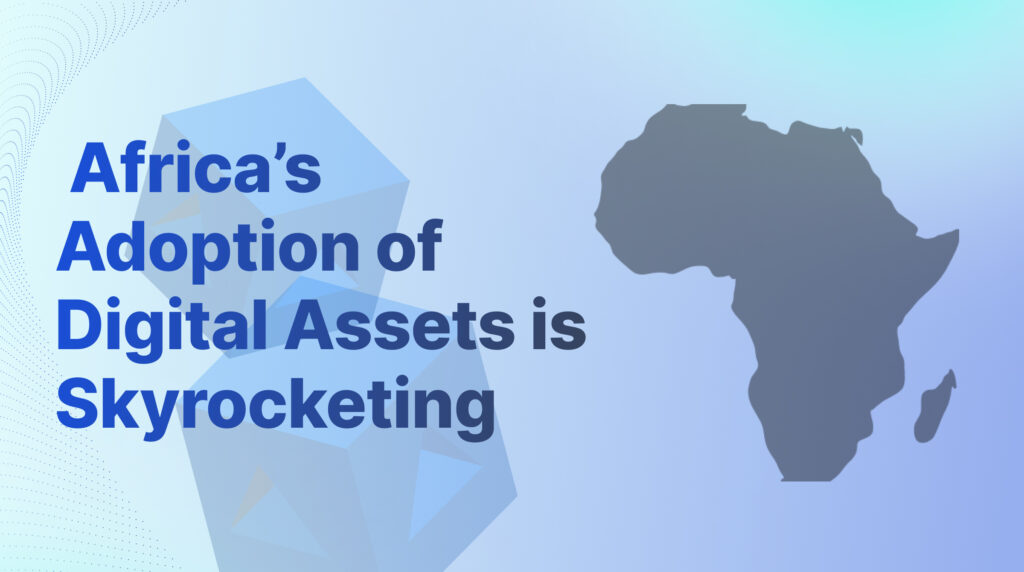Crypto adoption is remarkably high in Africa. According to the Chainalysis Crypto Adoption Report, several of the world’s leading countries for crypto adoption are African, with Nigeria taking the #2 highest rank overall. This is largely due to social and economic drivers across the continent, with digital assets offering a variety of benefits for African investors – such as protection against inflation, affordable cross-border transactions, and overall stronger financial access and inclusion.
While retail adoption of crypto is well-established in Africa, institutional adoption is just now beginning to accelerate. Even governments are beginning to launch CBDC projects, signaling a new era of digital asset adoption beyond the retail sector in Africa.
What makes Africa unique within the digital asset space?
Retail clients in Africa have already found that USDT and USDC are good ways to protect their savings against factors like hyperinflation; now, financial institutions are investing in crypto as a hedge against FX risks. In unstable economies, cryptocurrencies can help preserve wealth when local currencies devalue rapidly. At the same time, crypto can boost financial inclusion by providing access to digital wallets and DeFi platforms for those who lack a traditional banking option.
The high level of retail participation in the African market has led to better market infrastructure, such as improved trading platforms and regulatory frameworks – making digital assets more secure and more appealing for institutions. Recent developments, like the approval of Spot Bitcoin ETFs, show that institutional interest is growing in response to retail demand. Retail adoption has also boosted crypto’s credibility, reducing skepticism and making it more attractive to institutions. This synergy between retail and institutional investors accelerates market growth and evolution, with each influencing and driving the other’s engagement in the crypto space.
In South Africa, the market is fully regulated, offering distinct opportunities for growth. Crypto payments are gaining traction, with intermediary service providers facilitating crypto transactions with retailers through exchanges like Luno and Yellow Card. Such integrations highlight the increasing acceptance and practical applications of crypto in payments. Banks in South Africa are also increasingly working towards stronger blockchain and Web3 infrastructure in order to better serve their customers.
Institutional use cases for digital assets in Africa
Financial institutions in Africa have begun to embrace digital assets with a high level of enthusiasm. There are a number of strong use cases for these institutional investors, such as:
1. Trading and investment
Digital asset OTC desks are enabling global businesses operating in Africa to conduct high-volume crypto/fiat trades with minimal impact on the market. As it continues to grow, crypto is increasingly viewed as an alternative investment in several countries throughout Africa (such as South Africa), helping investors diversify beyond traditional assets.
2. Cross-border transactions and remittances
Crypto is revolutionizing remittances across the African continent, as it offers a faster, lower-cost way to send money cross-border – especially among migrant labor communities. Digital assets empower seamless local currency integration, enabling efficient cross-border transactions without the high fees and delays of traditional banking.
3. Multinational treasury management
African companies are looking to utilize digital assets to enhance pay-in/pay-out and treasury management processes. Yellow Card, the largest and first licensed stablecoin on/off ramp in Africa, leverages stablecoins that are pegged to the US dollar (such as USDT, USDC, and PYUSD) to provide users with a stable and reliable means of transacting. For treasury management, Yellow Card finds that holding assets in stablecoins enhances liquidity management and reduces costs associated with currency conversion and international transfers – making operations more efficient and cost-effective.
Africa is and will continue to be the center of mass adoption. At Yellow Card, we are building infrastructure that works for businesses across the continent. We’re excited to make our rails in 20 countries accessible via Fireblocks for any company that wants to invest and grow their business in Africa.
The institutional crypto ecosystem in Africa today
The institutional crypto ecosystem in Africa is characterized by several exchanges which cater to the local market with services such as mobile money integration and local currency support. OTC desks, provide secure, high-volume trading options for institutional investors. Issuers of digital assets, especially stablecoins and tokenized assets, are gaining momentum, facilitating financial inclusion, remittances, and investment opportunities across the continent. Cryptocurrencies are also being used as a hedge against inflation in countries with unstable currencies.
As the market is fully regulated in South Africa, regulated exchanges, custody providers, and OTC desks make up the institutional crypto ecosystem. Exchanges are being used by institutions for balance sheet diversification, while OTC desks facilitate large-scale transactions. Botswana and Nigeria have also begun to implement regulatory frameworks that provide clarity and support for the use of digital assets.
How Fireblocks supports institutional crypto in Africa
Yellow Card, Luno, and Quidax are just a few examples of fintechs helping to facilitate institutional transactions and liquidity in the African market. Each of them are Fireblocks Network Link clients, and we see them as critical fiat tools for institutions seeking to do business in Africa.


